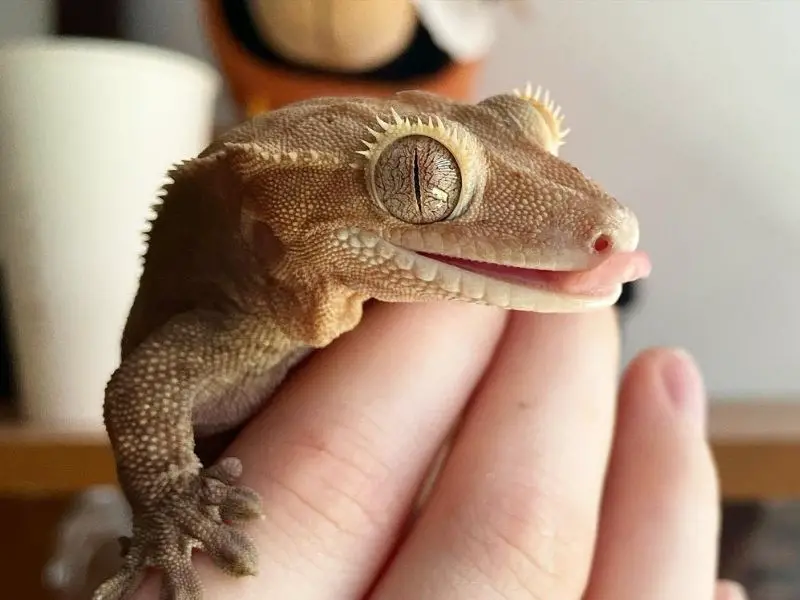Crested geckos are insectivores and they need to eat crickets or other insects at least twice per day. When they don’t seem interested in food for more than three days and won’t eat anything at all, then there could be a problem that you need to address.
Crested geckos that are not eating can be an indication that something is wrong with their enclosure, their health, or even the food you’re trying to feed them. High temperatures, dehydration, sickness, stress, and brumation are some of the main reasons crested geckos are not eating.
If you suspect your crested gecko is not eating because it’s unhappy with its environment, take steps to improve the habitat before attempting any other methods I’ve addressed below.
Why is my crested gecko not eating?

Before you determine the reason for the loss of appetite, it is important to check if the crested gecko is too skinny or underweight already, which can indicate a health problem that needs fixing as soon as possible. You might also want to consider whether the gecko is new to its environment or not, as this will guide you in determining the reasons why the gecko won’t eat.
Here are the reasons why your crested gecko is not eating:
1. The gecko is new to the environment
If you have just brought your new crested gecko home, it is possible that the gecko has not yet become accustomed to its new environment. It will take time for the new animal to get used to where they live and what their new surroundings are like.
The new environment can be a little intimidating for the small gecko, which causes it stress. A frightened gecko will not eat, but that doesn’t mean the pet has no appetite.
In order for a new crested gecko pet to be comfortable enough in a new environment to eat, make it feel as much like home as much as possible. Provide the gecko with familiar objects in its enclosure.
2. Dehydration
Dehydration in crested geckos is a big problem especially if the tank is not set up correctly with temperature regulated. Lack of interest in food (especially dry foods) is a common sign of dehydration in geckos.
Other signs of a dehydrated crested gecko include:
- Dry, wrinkled skin
- Weight loss due to muscle wasting
- Loss of the skin’s elasticity
The first thing to do if you think your pet is dehydrated is make sure they are getting enough fluids and water. Provide drinking water in the tank on a shallow dish. Do not create a large pool in the enclosure as crested geckos cannot swim except when it is out of natural instinct to save their lives.
3. Impaction
Impaction is a condition where the feces compresses into hard, dry pellets, which can be very dangerous for crested geckos because they are unable to defecate normally. A crested gecko that’s suffering from impaction is generally uncomfortable and won’t eat until the problem resolves.
When their fecal matter compacts and this can cause serious health issues like impaction constipation or even death if not treated promptly.
To fix digestive impaction in crested geckos and make them eat, use a reptile laxative or an osmotic agent to help alleviate the problem. Feeding them more fibrous foods and drinking plenty of water will also relieve compaction in geckos.
Fix humidity problems by misting their enclosure to keep the belly moist and warm. This goes a long way in helping the reptile with digestion and passing of fecal matter.
4. Brumation
Brumation is a natural process in cold-blooded animals where they hibernate for the winter months. Brumating geckos will usually find a cool, dark place inside of their enclosure to spend the fall and winter months before waking up in early spring when temperatures are warmer.
Brumation can last anywhere from weeks to months. During this time, the crested gecko won’t eat until when they come out of their brumation period. Just keep an eye on them until they start moving around again – this means that it’s time to actively start feeding the gecko again.
5. Stress
Your crested gecko not eating could be a sign that the reptile is stressed. Stress can be caused by many factors, such as:
- Lack of water and high humidity – this is especially dangerous in enclosures where the gecko may not have access to much moisture.
- Being handled too frequently
- Not enough hiding places
- Too little food or low quality diet (low protein content)
- Aggression from other reptile pets (if you have tank mates)
Stress can happen at any time, but most of the time, the gecko will show signs of stress due to external factors. I’ve noticed before that too much noise from kids playing near the gecko’s vivarium can also stress such pets, making them anxious. The result is usually poor feeding, hiding too much, and mass wasting.
What should I do if my crested gecko has stopped eating? If you think your crested gecko might stop feeding due to stress, try figuring out the stressors and eliminate them.
6. Low temperatures
Crested geckos may not eat if the enclosure’s temperature is too low (below 68F). When the temperature is too low, the gecko’s digestion system does not function normally, which leads to indigestion and poor metabolism.
Fix low temperature problems as a possible reason for your crested gecko not eating by by providing a heating mat in the enclosure and maintaining a temperature range between 68-70 F.
In an environment where it doesn’t get too cold and can thermoregulate its body temperature through basking., the crested gecko will start eating again.
If you don’t prefer a reptile mat, use a bulb to maintain optimal indoor temps for your pet while also providing controlled access to UVB light, which helps keep their skin healthy and aids in metabolism.
7. Humidity problems
Crested Geckos require high levels of humidity (50-60%) to properly digest their food and also shed their skin. If your gecko won’t eat, it is probably a sign that the humidity in the vivarium is too low, causing bodily stress to the pet.
I always make sure my crested gecko has access to both wet and dry areas in the enclosure at all times to prevent too much desiccation which can lead to loss of appetite and subsequent discomfort.
Crested geckos in low humidity areas are also more likely to stop eating due to sticky or clumping saliva in the mouth. With the heightened dehydration, the gecko’s skin dries out and becomes damaged.
If you suspect that your crested doesn’t have enough moisture, try misting him with a spray bottle or humidifier before feeding him live prey items like crickets to help contribute moisture to the body.
If you do not want to purchase an electric humidifier or small misting fan for the reptile’s tank you can consider safe live plants for crested geckos for this purpose.
8. Breeding season
During the breeding season, you might see a change in the feeding patterns in your crested gecko. During ovulation, female crested geckos may stop eating completely. This should not worry you as it is normal behavior.
The reptiles will start to eat again after the ovulation and egg-laying period is complete. The lack of feeding in female geckos during the breeding season is said to happen due to stress. This may be true especially in a reptile tank with tank mates.
Male crested geckos too may stop eating during the mating season. While some concentrate on dominance and fending off challengers, they fail to eat, which can lead to a little mass wasting.
Eventually, when the aggression and breeding is over, your crested gecko will start eating gain. If they don’t, call a reptile veterinarian for examination and help.
9. Shedding
Crested geckos are shedding animals, meaning that they regularly shed their skin in order to grow. When shedding, the gecko may not eat any food at all. The lack of eating may be caused by two factors:
- The normal avoidance of food until when the shedding process is complete
- A stuck shed on the face – usually mouth area.
When a crested has been shedding for an extended period of time and is not eating well or seems lethargic, it may be shedding into its esophagus (though this is rare).
If you suspect your reptile might have some kind of obstruction due to shedding, try giving him small amounts of moist food every day until the issue resolves itself.
If he continues to refuse food and sheds excessively than call a veterinarian immediately.
10. Illness
A crested gecko that’s not eating could be a sign of sickness. Infections in the mouth are severe, can cause pain when chewing, and force the gecko not to want to eat anything.
Respiratory illness are also a common problem that can cause your reptile pet not to eat at all.
The problem is, illnesses can be difficult to detect in lizards, especially crested geckos because they are nocturnal. Watch out for signs of sickness in your pet, which include the following:
- Lethargy and reduced activity
- Loss of appetite
- Mass wasting or weight loss
- Discharge
- Vomiting
- Swelling
If you suspect your crested gecko is refusing to eat due to an illness, take it to the nearest reptile veterinarian for proper diagnosis and treatment.
11. The crested gecko ageing
Another reason why your crested gecko won’t eat is age. Geckos do not live forever and as they age, their appetite may lessen.
As an old gecko loses the ability to move around normally due to bone weakness or another condition, he might be reluctant to eat. Geckos that are old and infirm should also have bowls of food placed in more than one location so that they can feed themselves easily without having a difficult time moving about.
How long can a crested gecko go without food?
Crested geckos can go for 2-3 weeks without eating and still be fine. For a normal feeding schedule, feed adult crested geckos 2-3 times every week but for juveniles, provide them with food everyday to encourage healthy growth.
Old and aging crested geckos can have less energy and may only feed a few times a week in order to maintain their body weight as well as keep up with the normal activity of their metabolism. If they don’t eat enough, they’ll easily become susceptible to illness.
Baby crested geckos have a high metabolism because they’re actively growing. Their bodies require more nutrients, so it is important to feed them on a daily basis without risking them becoming obese.
If baby or juvenile crested geckos won’t eat, it is a sure sign that something is wrong. Check their enclosure to make sure the setup is good and comfortable for them. Diagnose other reasons for not eating and fix them to make the pet start eating again.
Signs Your Crested Gecko is Skinny
Your crested geckos weight should be proportional to its size. If it is underweight, there may be a problem with the environment or diet that needs to be addressed.
- Underweight crested geckos will have protruding skin and bones in areas from head to tail.
- The eyes of an underweight gecko are dull-looking compared to fat ones.
- Sunken eyes will also appear as there will be reduced muscle mass around the head area.
-A healthy appetite for food can make a difference. if your crestie doesn’t eat as much one day but eats the next day then this could mean normal feeding behavior in geckos and similar reptiles. If you find that your crested gecko is underfed, try feeding them more insects until their body weight improves significantly.
READ NEXT: Metabolic Bone Disease in Crested Geckos: Signs, Treatment and Prevention Options

